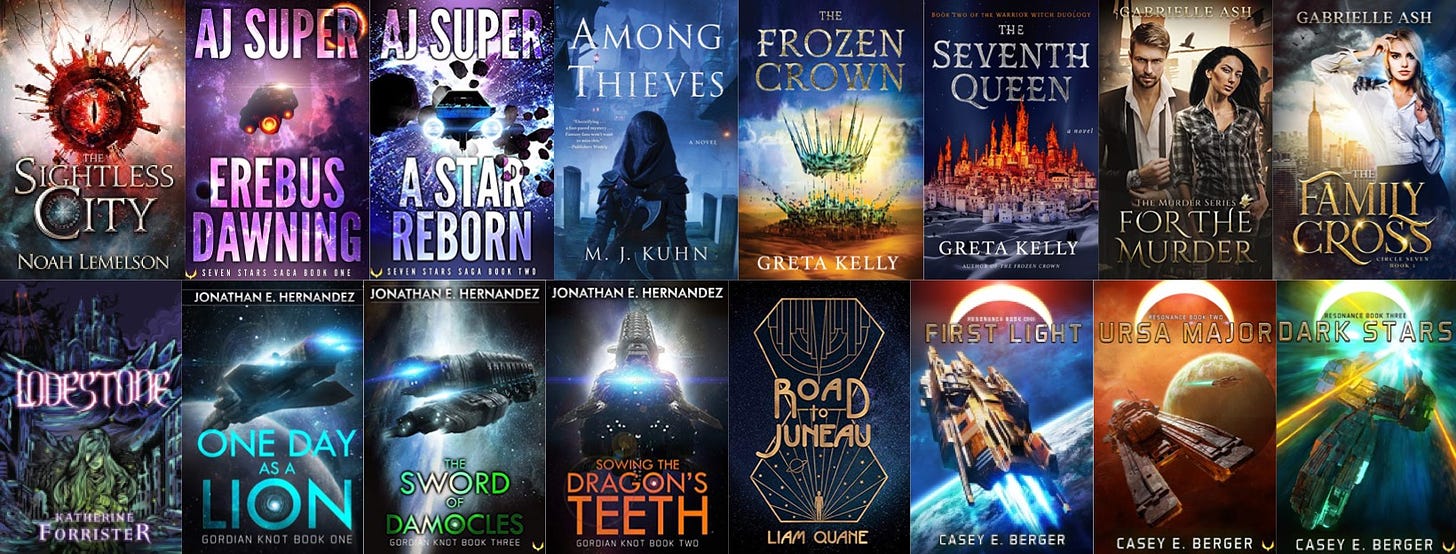Hello and Welcome to Swordfights & Spaceflights!
Swordfights & Spaceflights is a collaborative newsletter run by a group of current sci-fi and fantasy authors. In this biweekly publication, we’ll share book news, writing tips, inside scoops on the publishing industry, and more!
In this issue: We introduce what Swordfights & Spaceflights is all about, dive into five tips for worldbuilding in sci-fi and fantasy, and show you all the books out now from the Swordfights & Spaceflights team!
Who Are We?
We’re a group of both traditionally and indie-published authors representing a wide range of sci-fi and fantasy subgenres. Among the nine of us, we run the gamut of writing and publishing experiences, and we’re excited to connect with writers and readers who love SFF books as much as we do!
Every other week, you’ll receive a newsletter written by a different member of our team, sharing their unique experiences and advice, as well as announcements and important book and publishing news you need to know to keep up with the bookish community!
Welcome to the Swordfights & Spaceflights family, we’re excited to have you here!
5 Tips for Sci-Fi & Fantasy Worldbuilding
MJ Kuhn
Worldbuilding is one of my favorite parts of the novel-writing process, so I wanted to share my top five tips for creating amazing worlds for fantasy and sci-fi projects.
Stay Organized:
This is tip #1 for a reason! Worldbuilding is a lengthy process, and it can get unwieldy if you aren’t careful. Don’t just jot down worldbuilding notes in a notebook or, god forbid, on a lone sticky note doomed to get lost in your desk clutter: Create an organization system!
Personally, I use OneNote. I have separate tabs and folders for all my different kingdoms or cities. I can put inspiration images or draw maps right in the doc, and I can create as many subfolders as I want. But maybe OneNote isn’t the system for you! Maybe you like to have a big text document with headers for each section, or maybe you write out all your details on notecards, color code them, and spread them out over your floor while working.
It doesn’t really matter what your organization system is: What matters is that you have one.
Do Your Homework
Before you get too deep into your project, you may need to do some research. As a fantasy writer, you may not think there’s much research that needs doing: After all, you’re inventing the whole world, right?
True, but the people reading your book live in our world, so tying elements of your world back to concepts, cultures, or even just the laws of physics in our world is important. Do you want your planet to have multiple moons? You might want to see how that would affect the tides. Is your world frozen to the core? That may require some research about how to grow food in that type of climate.
Beyond the real-world research, you’ll also want to do your homework on the fictional side of things! If you’re writing a steampunk project, maybe pick up a few other steampunk books—familiarize yourself with the standards and tropes of your chosen genre. Then, you can choose to subvert them or include them as you see fit.Set Up The Basics
Your research is done and you have your organization system in place? Perfect. Let’s get into the nitty-gritty of worldbuilding. Set up the basics of your world first. A few of the things I always make sure to have ironed out include:Geography: How many kingdoms/cities/etc. are in your story world? How are they positioned in relation to one another? What about the landscape? Mountains, rivers, lakes, oceans. All of this information will help you get your bearings in your new world.
Economy: What is the economic structure of your world? Do the countries/kingdoms/planets etc. trade with one another? What conflicts might this economic structure cause in your world?
Political Structure: Who’s in charge of your world? How did they get to be in charge? How do the characters in your story feel about who’s in charge?
Don’t Forget Culture
Your story is probably about more than the world you’re building—it’s about the people (or beings) that live there! Those beings are going to have some sort of culture—a culture that will influence the way your characters behave. If you want your world to feel real, you’ll need to develop that culture.
Some cultural elements I always nail down before drafting include:Customs and Laws: These items will dictate your characters’ behavior in one way or another. If they’re law-abiding citizens, they’ll follow these laws to the letter. If they’re rebels, they’ll fly in the face of them. Either way: Knowing what those laws are will help shape your characters and your story.
Religion: What do people believe in? What holidays do they celebrate and why? How do people blaspheme in your world? These are all things that can influence your story and characters.
Leisure Activities: No matter how bleak or serious your setting is, people still will need to have something they do for fun. Do they play card games? Sing songs? Play video games? Even if the characters in your story will be too busy to do stuff for leisure, you’ll still want to figure out what counts as “fun” in your story world!
Know When It’s Time To Stop!
Worldbuilding can be an endless process. No, really, I mean it. You could worldbuild for YEARS and still feel like you don’t know enough about your project to get started. But if you try to nail down everything before you start drafting, you’ll never start.
That’s why my last tip is to know when to call it. How do you know? It will depend on your writing style. I have a list of world-related questions that I build while plotting out the basics of my story structure for each project. Once I know the answers to all those questions, I know it’s time to move on and start getting words on paper.
Take these tips for a test drive with your next project and see how real you can make your world feel!
Announcements
Book Releases!
Since this is our first newsletter, we wanted to share all the books from this group’s authors that are out now! For more information on any of these books, visit the associated author’s website, linked below!
Gabrielle Ash
The Family Cross
For The Murder
Casey E. Berger
First Light
Ursa Major
Dark Stars
Katherine Forrister
Lodestone
Jonathan Hernandez
One Day as a Lion
Sowing the Dragon’s Teeth
The Sword of Damocles
Greta Kelly
The Frozen Crown
The Seventh Queen
MJ Kuhn
Among Thieves
Noah Lemelson
The Sightless City
AJ Super
Erebus Dawning
A Star Reborn
Liam Quane
Road to Juneau







